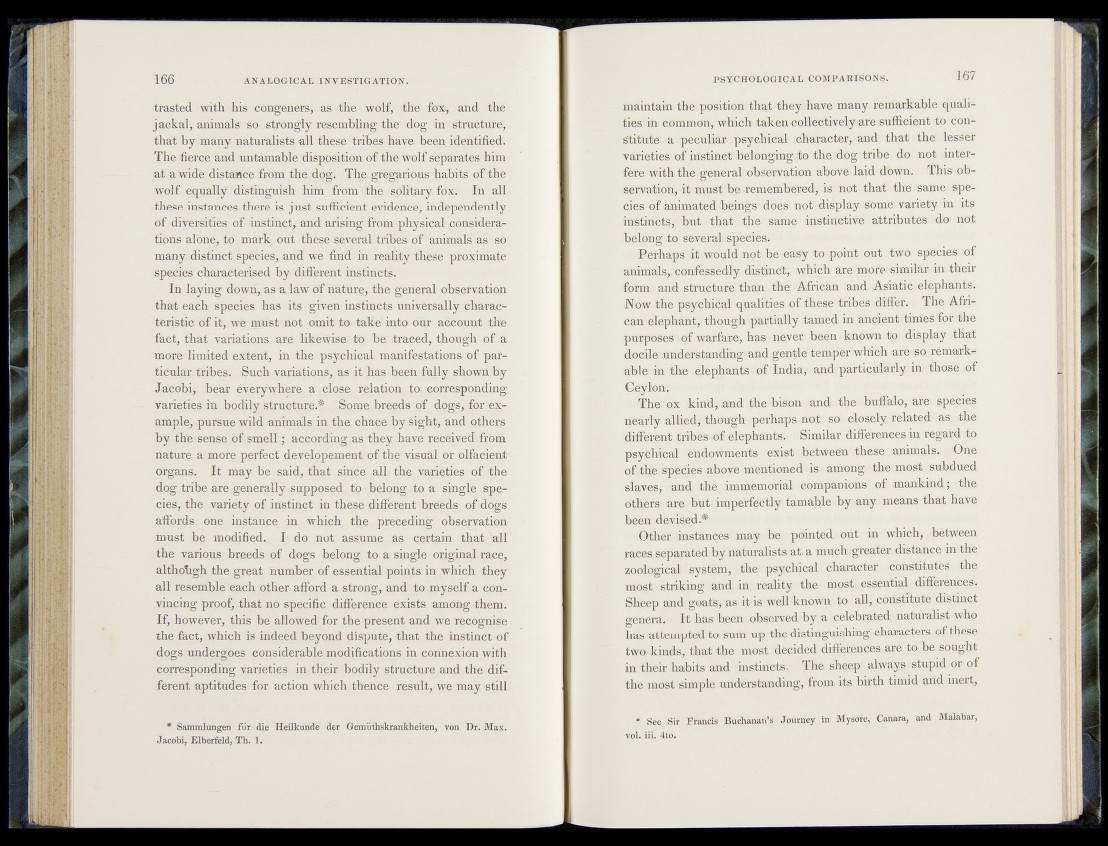
trasted with his congeners, as the wolf, the fox, and the
jackal, animals so strongly resembling the dog in structure,
that by many naturalists all these tribes have been identified.
The fierce and untamable disposition of the wolf separates him
at a wide distance from the doe;. The gregarious habits of the
wolf equally distinguish him from the sobtary fox. In all
these instances there is ju st sufficient evidence, independently
of diversities of instinctr and arising from physical considerations
alone, to mark out these several tribes of animals as' so
many distinct species, and we find in reality these proximate
species characterised by different instincts.
In laying down, as a law of nature, the general observation
that each species has its given instincts universally characteristic
of it, we must not omit to take into our account the
fact, that variations are likewise to be traced, though of a
more limited extent, in the psychical manifestations of particular
tribes. Such variations, as it has been fully shown by
Jacobi, bear everywhere a close relation to .corresponding
varieties in bodily structure.* Some breeds of dogs,, lmvexample,
pursue wild animals in the chace by sight, and others
by the sense of smell ; according as they haye received from
nature a more perfect developement of the visual or olfacient
organs. It may; be said, that since all the varieties of fflfp
dog tribe are generally supposed to belong to a single species,
the variety of instinct in these different breeds of dogs
affords one instance in which the preceding” observation
must b e modified. I do not assume as certain that, all
the various breeds of dogs belong to a single original race,
althotigh the great number of essential points in which they
all resemble each other afford a strong, and to myself a convincing
proof, that no specific difference exists among them.
If, however^ this be allowed for the present and we recognise
the fact, which is indeed beyond dispute, that the instinct of
dogs undergoes considerable modifications in connexion with
corresponding varieties in their bodily structure and the different
aptitudes for action which thence result, we may still
* Sammlungen für die Heilkunde der Gemüthskrankheiten, von Dr. Max.
Jacobi, Elberfeld, Th. 1.
maintain the position that they have many remarkable qualities
in common, which taken collectively are sufficient to constitute
a peculiar-psychical character, and that the lesser
varieties of instinct belonging to the dogs tribe do not interfere
with the general observation' above laid down. This observation^
dt must be remembered, is, not that-the same species
of animated-beings does not display^eme variety in its
iUftihctsy but- that 'the same' instinctive-attributes do toot
belong to several species^
Perhaps it would not be easy to point out two- specie* of
animals, confessedly distinct; ;w;hicb are more similar in their
form and structure than* the African 'hhdytAsiatiG elephants*
Now the psychical qualities of fheSe; tribes differ. The African
elephant, though partially itamed in ancient-timestfor the
purposes at warfare, has* never been v known to display that
docile understandings and« gentle temper which »are sorema-rk-*
able-iin the elephants of India, and particularly: ins thosev;of
_ ;0 eyl©HU.. ■
The ox kind, and the bison and the buffalo, are species
nearly allied, though perhaps mov. so closely delated as ,the
different fcribes wf elephants.» ' .Similar diffCTence&insegarff <1.®
psychical endowments exist between these, animals, . Qne
of the species above mentioned-is" among the mo,st «subdued
slaves,' and the immemorial companions of: mankind; the
Others are but imperfectly tamable by any means that hayed
been devised.* 11
■ Other instances may be pointed out in which, : between
races separated by naturalists a t a much greater distance in the
zoological! system, «the psychical character?’« constitute®': the
most striking’ andi in reality| the. mQSti|essential;, differences.
Sheep and goatte* as it is well known to alb constitute distinct
genera* I t has been , observed by a -celebrated naturalist, who
has attempted to sum up the distinguishings characters of these
two kinds«, that the most decided differences are to-be ^aught-
in their habits and instincts* jj ,VThe sheep* always * stupid «0®.* of
the most simple understanding, from its birth timid and inert*
* See Sir Francis Buchanan’s Journey in Mysore, Canara, asM Malabar,
vol. iii. 4to.